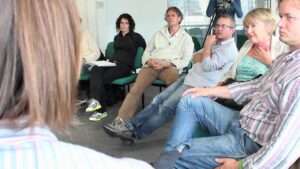Bristol Free University by David Saunders
Bristol Free University aims to ‘fund’ free education through trade apprenticeships in the ’emerging’ green economy, as and when it emerges. The idea would be like sandwich courses or German ‘Berufsakademies’.

With a mix of real work, real education in sustainability, and a strand also of personal and community development where students learn innovation, entrepreneurship and enterprise creation.
While the focus is on sustainability, we plan to draw heavily on experience of an innovative (largely black) student-led business university in South Africa, CIDA (www.cida.co.za) which achieves very low running costs through the students running the place, gaining extensive practical experience of running a leading knowledge-based business on co-op principles.
Bristol is arguably the UK’s leading Green Capital, and has twice been shortlisted as a finalist in the EU Green Capital competition. Having entered a third time in 2012, it cheerfully expecs to become EU Green Capital 2015. This means making visible improvements across a wide range of indicators including air quality, waste handling, transport, energy, housing, education, participation, innovation and more.
Having a university which both researches, teaches and is actively involved in making these changes will be a huge asset in helping others do the same and Bristol already has a leading annual Green Festival, which serves as a prototype for showing the world what works in 2015.
The challenge that we want to take on in our Free University is how to bootstrap the Green Economy, and thereby create the economic activity that pays for the jobs, and for the ‘free’ education. In our business planning process, we identified that the solar economy may well be the way to go. Solar is small right now but we see it as the key disruptive technology that will change the way we relate to energy. It’s just right now becoming demonstrably cheaper than fossil fuels, and this will only continue.
The Bristol region has room for 2Gw of solar PV on its roofs, which would be an investment of £2Bn right now, creating £250m worth of energy a year, and £600m worth of jobs in the installation. This may sound a lot, while the UK only has a total of 1Gw of solar, but Germany has 31Gw, and is still growing its solar fleet at over 60% per year…
In case this sounds fanciful, we have already started a solar co-operative, Bristol Power (www.bristolpower.coop) to bootstrap a community-wide solar rollout, or to act as a model (‘proof of concept’) of how such a rollout can happen. And we have what is currently a contrarian, but we feel highly realistic view of our solar future. Solar energy has been on an exponential growth curve for some time, but only in 2011 reached the point where it supplies 0.5% of the world’s electricity and 5% of Germany’s.
It was also the year that solar energy finally became cheaper than fossil electricity, and the growth rate shifted from 60% per annum, compound, up to 75%. We see this as a revolutionary / evolutionary shift, and a great one to base a free green university around.
Other major investments and employments in the Green Economy would include building lower cost eco-homes in ecovillages round the city, which would double as community farms, with shifts away from petrochemical power to more human input. And also changing the food distribution system to much more locally sourced food, with much less profit extraction by supermarkets.
Then there’s changes to our transport systems, to our carbon sequestration more trees in farming and agroforestry. Plus an new and integrated planning process that brings together the public (citizens), developers, planners and elected councillors, rather than the present broken process, as recommended by Sir John Egan in his 2004 Egan Review of Skills for Sustainable Communities.
I was living in Silicon valley when Microsoft Office came out, and the Mac with its GUI and OS. And the point is that the biggest and most revolutionary application was not a word processor, or a spreadsheet, a database, or email or a presentation graphics programme, but integration of all of these, in one OS, with similar interface and cut-and-paste, and being able to buy all five programmes in a box for the price of any single one competing programme.
This was so powerful an innovation that it killed all the competition, and investment in similar applications, stone dead for a while. It’s not that I want to kill the competition but that we see the value of looking at all aspects of sustainability in a similar way. A free ‘green’ university with an integrated degree programme around sustainable communities and cities.
There’s a lot to be done to create sustainable communities, and a huge future in students learning an integrated package of skills for sustainable living. Jan Klostermann, a colleague who has completed a Masters programme in at the Technology University in Munich, wrote both his dissertation and a business plan as part of his coursework. So we already have a plan that gives a business model for integrating work in the green economy with education around sustainability and personal and community development including innovation and entrepreneurship, and enterprise creation.
His thesis looked at the needs for cutting edge enterprises for new recruits, and found that physical and intellectual development are no longer enough. The students and apprentices of the future need strong development of Self, and leadership in the future is seen less as based on hierarchy and far more around personality and communication skills of the sort that our university will develop.
